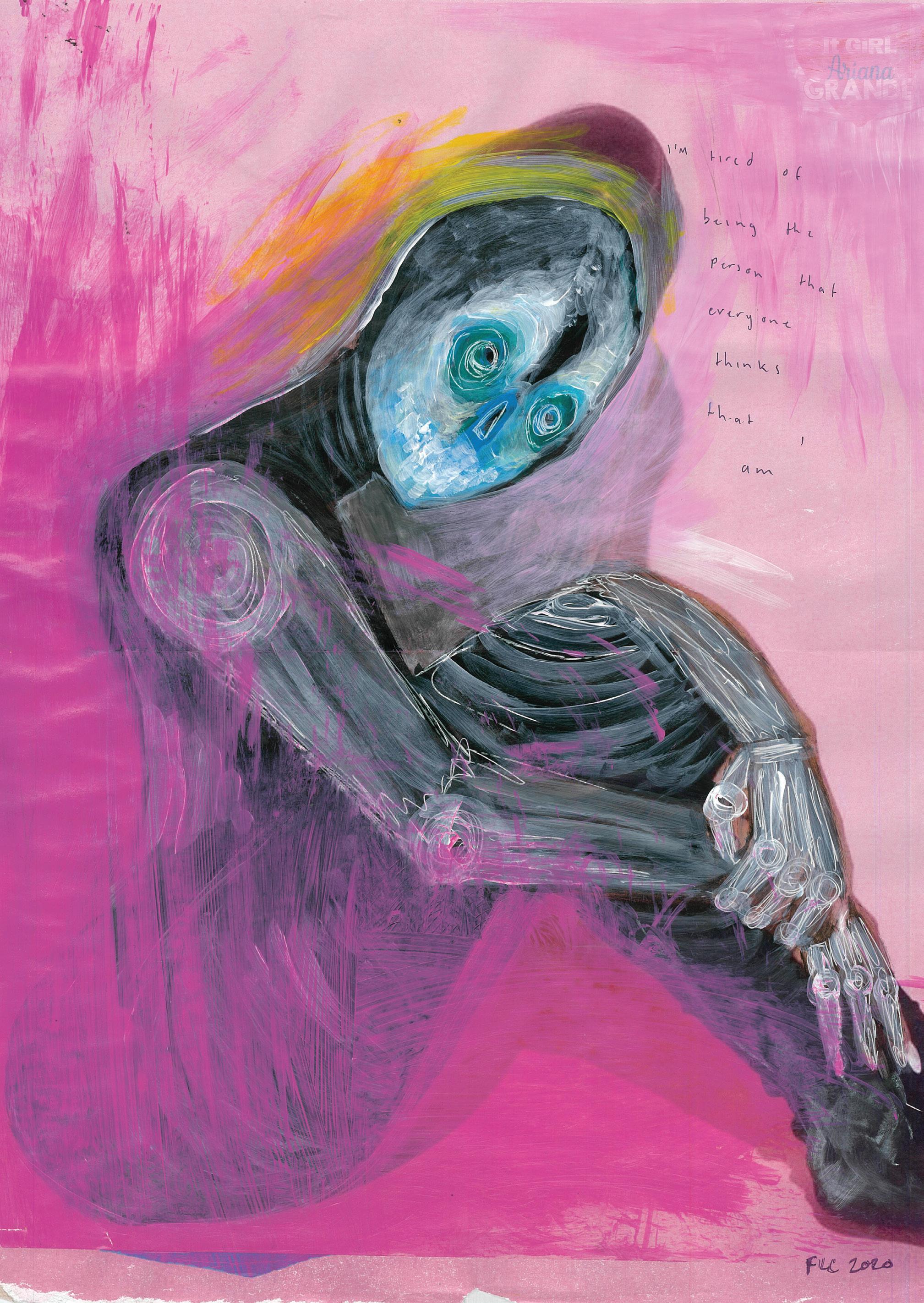
4 minute read
Imagine: Frances Cohen
Frances Cohen
Interview Christina Massolino Right: “Jaded” 2019, acrylic and ink on magazine print, 22cms x 30cms
Frances Cohen is a third-year Contemporary Art student at UniSA. Attending uni while struggling with anxieties can be exhausting, particularly for art students, as creativity is often extremely personal, causing you to feel even more vulnerable when attending classes or producing works for assessment. Frances is well versed in these experiences and has shown extreme resilience through seeking help and channelling anxieties into art.

How do your mental health experiences inform your art?
My mental health is the filter through which I experience the world, so my art is informed by it because it comes from me. My therapist told me I live too much inside my own head; that I wear myself out thinking in circles. It can be hard for me to make sense of my thoughts because I have so many swirling around at once. So, I journal a lot to figure my shit out. While I’m writing, I start to notice recurring patterns in my thoughts and behaviours. These motifs are what I end up basing my artworks on.
What has been your overall experience of attending art school while battling anxiety, particularly in relation to accessibility of services and class participation?
I failed a lot of classes in my first year due to my inability to participate. I would make it 20 minutes into a two-hour class before my anxiety would get the better of me, but it also made me unable to reach out to anyone. I was going to be dropped from the program, but at the meeting they put my first Access Plan in place instead. It has made me miss out on a lot; I wanted to learn ceramics, but I was getting physically sick having to work in front of others, so I had to drop it.
Do you think there’s a lot more students struggling with this than we realise?
Definitely. I think, even though we are making incredible progress in opening up the conversation around mental health, there is still a lot of stigma attached to being the person going through it. I have found a lot of people are happy to be on the “listening end” of the conversation, but will pause when it comes to opening up about their own struggles. To add to that, mental health can make it hard to talk to people full stop. I was too anxious to talk to my teachers, so they couldn’t help with something they didn’t know about.
You’ve become quite open in talking about your experiences. Was there a specific moment in attending art school where you felt you needed to be more open?
I started my degree in 2015; in 2018 they put a contributor call out for that year’s mental health edition of Verse and I submitted a piece about my experiences. I received a couple of messages from people who read it and saw themselves in it. Knowing I wasn’t the anomaly gave me the confidence to be a bit more open. Then, I found that the more open I was, the more reciprocal people were. All I wanted in my first years was someone I could relate my experiences to, so I decided I would be that guy.
I feel like no matter what course you do, struggling with anxieties and other mental illnesses can be extremely difficult. In my experience though, with art being so personal, it can be even more daunting to attend or share your works. Have you found this too?
For sure. I really struggle with feeling inadequate; like I’m a fraud and I shouldn’t even be pursuing this. I have tried very hard to change my thinking, but I can’t seem to shake the fact that how I feel about my work and my ability is directly correlated to the praise and validation it receives from others. Which is terrifying, because art is so subjective. It doesn’t matter how many hours you put into creating something, not everybody is going to understand it and nobody is under any obligation to like it.
How do you hope your art will help or impact viewers?
I want new artists to see that there is no right way to be an artist. Just because you can’t paint like Heysen doesn’t mean you can’t paint; the ideas that underpin your work are more valuable than the technique. I hope my art encourages people to be more open and honest, with themselves and with each other. We are all messy and we are all just doing our best. Most importantly, I hope people who are struggling can find something to relate to in my writing or my weird art. I’m one of you, and I’m here for you.


Left: “Speak Up” 2020, acrylic and ink on magazine print, 22cms x 30cms Right: “Hot Mess”, 2020, acrylic and ink on magazine print, 22cms x 30cms











